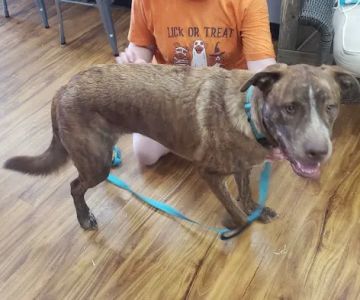What are the Signs That My Dog Has a Digestive Problem?
- 1. Understanding Digestive Issues in Dogs
- 2. Common Signs of Digestive Problems in Dogs
- 3. Causes of Digestive Problems in Dogs
- 4. Treatment Options for Digestive Problems
- 5. Preventing Digestive Issues in the Future
1. Understanding Digestive Issues in Dogs
Digestive problems in dogs can affect their overall health and well-being. When a dog experiences issues like vomiting, diarrhea, or constipation, it can be distressing for both the dog and its owner. Recognizing the signs of digestive problems early on is essential for ensuring that your dog receives the proper treatment and care. Digestive issues can be caused by a variety of factors, including infections, allergies, or changes in diet.
2. Common Signs of Digestive Problems in Dogs
There are several common signs that may indicate your dog is experiencing digestive issues. It's important to be vigilant and aware of these signs so that you can seek appropriate care. Some of the most common signs include:
1. Vomiting
Frequent vomiting can be a sign of a digestive issue. It could indicate anything from mild indigestion to a more serious gastrointestinal disorder. If your dog vomits several times within a short period, it’s time to visit the vet.
2. Diarrhea
Diarrhea is another common symptom of digestive problems. While occasional soft stools may not be a concern, persistent diarrhea can lead to dehydration and may indicate an infection, food intolerance, or a more serious underlying issue.
3. Constipation
If your dog is having difficulty passing stools or seems to be straining, constipation can be a sign of digestive distress. Chronic constipation may require medical attention and dietary adjustments.
4. Decreased Appetite
A sudden loss of appetite can indicate that your dog is experiencing discomfort due to digestive problems. If your dog is reluctant to eat or is eating significantly less than usual, this could be a red flag.
5. Excessive Gas or Bloating
Excessive gas or bloating can be uncomfortable for your dog and is often a sign of digestive issues such as indigestion or an imbalance in their gut flora. If your dog is gassy or visibly bloated, it’s important to monitor them closely.
3. Causes of Digestive Problems in Dogs
There are several potential causes of digestive problems in dogs. Understanding the root cause is crucial in determining the appropriate treatment. Some common causes include:
1. Dietary Issues
Changes in diet, eating too quickly, or consuming something that doesn’t agree with them can all lead to digestive issues. Some dogs may have food sensitivities or allergies that cause gastrointestinal discomfort.
2. Infections
Bacterial, viral, or parasitic infections can cause vomiting, diarrhea, and other digestive problems. Dogs that are exposed to unsanitary environments or other infected animals are at greater risk of digestive infections.
3. Stress and Anxiety
Stress and anxiety can manifest physically in dogs, including digestive upset. Changes in environment, routine, or the presence of new pets or family members can trigger digestive issues.
4. Inflammatory Bowel Disease (IBD)
IBD is a chronic condition that causes inflammation in the dog’s intestines and can result in symptoms such as vomiting, diarrhea, and weight loss. It may require lifelong management with special diets and medication.
5. Underlying Health Conditions
Certain health conditions, such as pancreatitis, liver disease, or kidney disease, can also cause digestive problems. It’s important to have your dog diagnosed by a veterinarian if you notice persistent digestive issues.
4. Treatment Options for Digestive Problems
Treating digestive issues in dogs depends on the underlying cause. Here are some common treatment options:
1. Dietary Changes
If your dog’s digestive problems are caused by food sensitivities or allergies, switching to a specialized diet may help. Your vet may recommend a hypoallergenic or easily digestible food.
2. Medications
Depending on the diagnosis, your vet may prescribe medications such as antibiotics, probiotics, or anti-inflammatory drugs to address the digestive issues.
3. Fluid Therapy
If your dog is dehydrated due to diarrhea or vomiting, fluid therapy may be necessary. This can help restore electrolytes and prevent further complications.
4. Surgery
In severe cases, such as when there is a blockage or other structural issue, surgery may be required. This is typically a last resort after all other treatment options have been exhausted.
5. Preventing Digestive Issues in the Future
While not all digestive issues can be prevented, there are steps you can take to reduce the likelihood of your dog developing gastrointestinal problems:
1. Maintain a Consistent Diet
Feeding your dog a balanced and consistent diet is key to maintaining their digestive health. Avoid sudden changes in food and ensure they are eating appropriate portions.
2. Regular Vet Checkups
Routine vet visits can help catch any health issues early, including digestive problems. Regular checkups allow your vet to monitor your dog’s overall health and catch any signs of illness before they become serious.
3. Reduce Stress
Minimize stress in your dog’s environment by keeping their routine as stable as possible. A calm environment can promote healthy digestion and reduce anxiety-related gastrointestinal upset.












